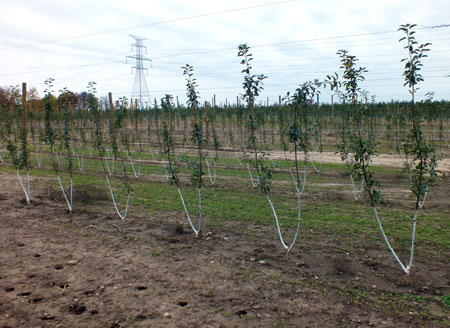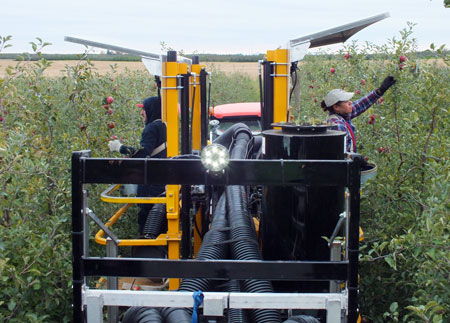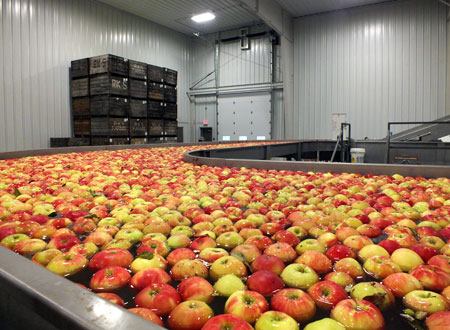Growing ideas for farming in northwest Michigan
Young farmers from northwest Michigan visited farms on the Fruit Ridge last week.
Many participants of the two-day Fruit Ridge tour were members of the New Farmer Assistance and Resource Management (FARM) Program, an effort put together by Michigan State University Extension educators Nikki Rothwell, Erin Lizotte and Rob Sirrine to support and educate young farmers of northwest Michigan on leadership, agricultural production, farm management and marketing. On this tour, participants visited eight locations to learn about high density apple and cherry orchard production, new harvesting approaches, apple packing line technology, growing and marketing hops and creative ideas for farm markets.
The first stop was in Grant, Mich., where Pete and Bill Nyblad, apple growers from west Michigan, gave a guided tour of their farm’s high density apple orchard. On the tour, Phil Schwallier, tree fruit horticulture Extension educator, emphasized the importance of selecting rootstocks and varieties that keep trees at manageable sizes for high density systems. The young farmers also observed the Nyblad’s orchard of biaxis or double branch apple trees. The biaxis training style creates a fruiting wall in contrast to the traditional upright or vertical training system that is common in Michigan orchards.

At Riveridge Produce Marketing, Inc., Phil Brown of Phil Brown Welding provided a demonstration of the innovative Dietrich, Brown, and Rasch (DBR) apple harvester in a high density apple orchard. The DBR harvester is a tractor-pulled hydraulic platform that supports up to four pickers at one time. These pickers target apples higher in the tree canopy and trail behind ground-level pickers. The harvester is equipped with lights for nighttime harvesting and bottomless picking baskets that move apples to bins through a vacuum powered hose network.
Some of the young farmers tested the DBR harvester in the field. Garrett Coggon shared his thoughts, “I was really quite impressed with the DBR harvester. It could be adjusted to position workers right in the canopy within easy reach of the fruit. Also, fruit quality held up well through the harvester.”

Don Armock, President of Riveridge Produce Marketing, Inc., gave the group a tour of Riveridge’s high density sweet cherry orchard. The orchard is comprised of seven cherry varieties that were planted in 2008 and 2009. Armock said he was able to pay off the orchard this year due to its high profitability. His success story made the thought of planting high density sweet cherries attractive, but growers identified potential pitfalls. The close proximity of the trees is not conducive for mechanized harvesting using the traditional tree shakers. Therefore, a good labor force for harvest is required, a challenge that many Michigan fruit growers faced this year.
The group also gathered at Rasch Farms in Conklin, Mich., for dinner and discussion of the future of Michigan’s fruit industry with west Michigan growers and MSU Extension educators. Jessica Rasch, MAEAP technician and daughter of the dinner hosts, said, “The dinner was a great way to form relationships, network and share new ideas with the next generation of growers.”
On the following day, the New FARM group visited Elite Apple Packing Company LLC, where they observed new apple packing technology in action. This packing facility is the newest in Michigan and uses the latest apple sorting and scanning technology. Most of the young farmers do not plan to incorporate packing technology of this scale on their farms, but there are some who may install smaller packing lines.

The final stop at Ed Dunneback and Girls Farm Market provided an opportunity to observe a successful agritourism business and diverse farm market. Suanne Shoemaker, one of the “Girls,” supplied cider and donuts in the gift shop, a trip through the corn maze, as well as a tour of her farm’s newest endeavor, the hop yard. Suanne’s hops were processed by Hop Head Farms, a hops farm, processor and distributor.
“The tour was great,” said Travis Bratschi, a New FARM member and grower from Williamsburg, Mich. “It showed how progressive farmers are coming with technology, especially within the apple industry.”



 Print
Print Email
Email
